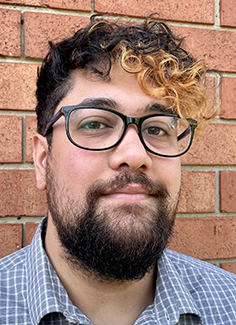Community
Copyright@ Australian Catholic University 1998-2026 | ABN 15 050 192 660 CRICOS registered provider: 00004G | PRV12008
Copyright@ Australian Catholic University 1998-2026 | ABN 15 050 192 660 CRICOS registered provider: 00004G | PRV12008

Ever taken the time to ask yourself: Who am I? It’s a question with many possible answers, says Jordan Hinton, a social psychology researcher whose work explores the relationship between identity and self-concept. Most of us have several identities, some of which we connect with more than others.
“For example, you might be somebody who identifies as a writer, but perhaps more when you’re at work than when you’re not at work,” says Jordan, who lectures in psychology with ACU’s School of Behavioural and Health Sciences.
You might describe yourself as thoughtful and funny, or say that you’re a student or a person of faith.
“With me personally,” he adds, “I’ve got lots of different identities, and among the strongest for me is being an academic and a researcher, but I also come from a mixed-ethnicity background and I’m a member of the queer community. There are many different parts of me, just like there are many different parts of most people, so when we ask somebody, ‘Who are you?’, they’ll likely have several different answers, and those answers might be different depending on the context in which the question is asked.”
When it comes to social identities, research suggests that a person’s connection with their group often becomes an important factor in how they see themselves.
“Social identification tends to be about how much we belong with an identity and the strength of that belonging, and of course, that can also be very context-dependent,” Jordan says. “We find that aspects of social identity can be internalised, and that helps a person to connect with other people in that group, while also shaping things like self-perceptions, beliefs and behaviour.”
Jordan’s PhD research is concerned specifically with those who identify as lesbian, gay, bisexual, transgender, and queer (LGBTQ).
Exploring this topic is important, he says, because even in this day and age, people in the LGBTQI+ community commonly experience prejudice and associated mental health issues. He cites Australian research showing that up to 78 per cent of queer individuals report being discriminated against because of their identity, with some 60 per cent diagnosed with depression – a much higher rate than the general population.
“In one sense it is staggering to see how prevalent it is,” he says, “but coming from within the community, I guess it’s not all that surprising because people in the queer community are accustomed to discrimination experiences and the mental health difficulties that stem from these increased levels of discrimination.”
Given the extent of this problem, Jordan Hinton sought to use his PhD thesis to explore how LGBTQ identity relates to both health outcomes and experiences of prejudice.
Drawing from a sample of some 1500 queer Australians and a systematic review of the available literature, his research has revealed the double-edged sword effect of holding a queer identity.
“This is a central aspect of my thesis – the attempt to understand that belonging to the queer community and internalising a sense of importance to this identity comes with both benefits and costs,” he says.
While previous research in this area has explored those costs and benefits separately, Jordan’s research investigates how they act simultaneously.
“What my research has found is that the positives and negatives that come with queer identity don’t outweigh each other; rather, they create this double-edged sword effect where they are both present. The identity tends to boost a person’s feelings of connection and pride, which in turn leads to better health outcomes. But this increased awareness of their identity makes them more sensitive to the stigma and discrimination directed towards their group.”

In turn, this heightened sensitivity can lead to poor mental health outcomes – especially for certain sub-groups within the broader LGBTQ community. For example, Jordan’s research found that transgender individuals experience more stigma sensitivity than gay, lesbian and bisexual individuals – an indication that negative social attitudes towards trans people are particularly prevalent.
“Unfortunately, it appears there may currently be more discrimination towards the trans and gender-diverse communities,” says Jordan, “and there are a few different ways that can play out, but often being the target of discrimination is a process that takes up a lot of mental and emotional energy and can be quite depressing, and that’s where we see some of these negative health outcomes.”
Jordan Hinton’s journey to exploring LGBTQ identity in his research began in earnest around a decade ago, when he was studying for his bachelor’s degree at ACU.
At the time, he had two main passions: music and psychology.
“I did music as my minor and psychology as my major with the idea of using music in therapy or something along those lines, and it was during that time that I started to fall in love with social psychology, which deals a lot more with people’s social interactions and the effect that has on individuals,” says Jordan, who went on to complete a Graduate Diploma in Psychology.
After a three-year hiatus from study, when he worked as an academic across the University of Melbourne and ACU, he began to examine more closely a topic he had both professional and personal interests in.
“At that stage, I was working more in the methodological and statistical related aspects of psychological studies, and I started to want to pursue research on the queer community,” he says, adding that there were dual motivations for exploring this area of research.
“It’s long been a subject I’ve had an interest in understanding and contributing to, in terms of furthering knowledge, and I think there was a sense of self-exploration in there, as well. Growing up as a gay cisgender man, there was coming-out process and all these different things that helped me to develop a sense of self, and going through that process prompted me to want to explore how others experience it, and how it affects them.”
Jordan Hinton commenced his PhD in 2019 and is currently in the final phase of his project, which involves analysing data to better understand and explain the double-edged sword effect of LGBTQ identity.
In mid-2022, he was one of six ACU students chosen as finalists in the Three-Minute Thesis (3MT) competition, winning the Runner Up and People’s Choice Award.
In his 3MT presentation, Jordan sums up the importance of his research by emphasising its usefulness to future researchers, practitioners, and policymakers in establishing ways to improve the lives of queer Australians.
Furthermore, he says the research can help anybody who identifies strongly with a particular social identity, be it related to race and ethnicity, class and socioeconomic status, or gender and sexual orientation.
“So, the next time you ask yourself, ‘Who am I?’, and you answer with a social identity, have a think about whether or not that identity is an important part of how you see yourself,” Jordan says. “These invaluable aspects of our identities, even the ones that can make us feel more marginal, can enhance our sense of belonging, connect us to similar others, and perhaps most importantly, benefit our wellbeing.”
Jordan Hinton is a social psychology researcher and PhD candidate exploring relationships between LGBTQI+ identity, health, and prejudice. He also works for Orygen, a youth mental health service led by Professor Patrick McGorry, and at ACU, where he lectures in statistics and identity psychology.

Copyright@ Australian Catholic University 1998-2026 | ABN 15 050 192 660 CRICOS registered provider: 00004G | PRV12008